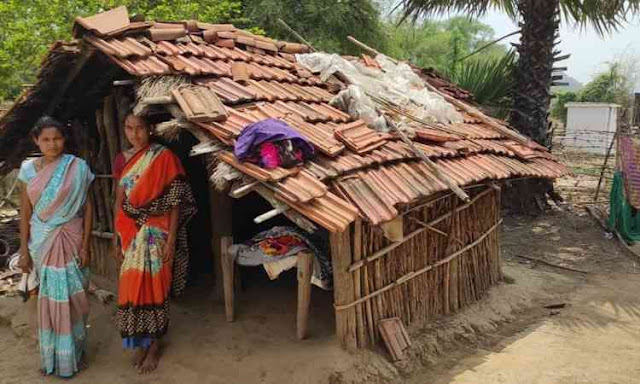Menstruation: In India, it is believed that "touching" the "unclean" woman during her period has made her unclean.
In India, unclean women are sent to huts
In India, unclean women are sent to huts and they have to stay in a hut for five days every month according to the custom. Not only that, these huts are located just outside the village, on the edge of the forest. In other words, this time they have to be in 'one room'.
They are not allowed to cook. Water is not allowed to be drawn from the village well. The women of the house have to spend their days drinking food and water given to them by their relatives. If a man touches them, the man has to take a bath immediately, because the "unclean" woman is considered to have become "unclean because of touching him."
Women and teenagers are evicted from their homes,
The women of Kanal Tola village are forced to stay in this slum during menstruation. There is no door, no way of life.
In the Indian state of Maharashtra, thousands of women and adolescents are still evicted during their menstrual periods. On menstrual days they are forced to live in uninhabitable huts.
A Mumbai-based voluntary organization has started a project to help these women build modern pucca houses in place of dilapidated huts.
These monthly huts are locally called "Kurm Ghar or Gaokar."
But their work has been widely criticized for trying to perpetuate this inhumane practice instead of abolishing it.
Critics say it would have been a timely move to tear down the huts, which were set up to keep girls apart during menstruation.
However, the Kherwadi Social Welfare Association says it wants to ensure the safety of women by providing them with shelters, toilets, beds, water and electricity. They say they are also in favor of abolishing this practice.
In Indian society, girls have to spend a period of time in a socially taboo period. Women are considered unclean during menstruation and have to abide by strict restrictions.
They are forbidden to attend all social and religious ceremonies and are not allowed to enter temples or any religious monuments, not even kitchens.
However, women from the Madiya community in Gadchiroli, one of the poorest and most underprivileged districts in Maharashtra, face extreme restrictions during menstruation, which transcends all other social restrictions.
The women of Tukum village say,
The women of Tukum village have welcomed the first modern pucca house built by a voluntary organization in Mumbai.
They say that before the period was over, they were really scared, thinking that they would have to live in a broken hut at the end of the village. Because there are no windows or doors in the thatched house made of mud and bamboo. Nothing is needed to live in the neighborhood. They have to walk a kilometer to bathe or wash their clothes.
The women of Tukum village say the new pucca house has made it tolerable for them to be apart during the days of their period
Surekha Halami, a 35-year-old resident of the village, says the hut is unbearably hot in the summer, and there is a mosquito infestation. In winter it is very cold and in the rainy season the house is constantly flooded with rice and it becomes a pond in the middle of the house. Sometimes dogs and pigs come in.
Another woman, 21-year-old Shital Naro, says she is afraid of not being able to sleep all night if she is alone in the hut. "It's pitch dark inside and out. I want to go home all the time, but there's no way."
The girls that are unclean during the season,
Her neighbor, Durpata Usendi, 45, says a 21-year-old woman was bitten by a snake ten years ago while she was in the hut.
"We woke up after midnight. Then she ran out of the hut crying and screaming. Her female relatives tried to help her, they brought her some herbs and local medicine."
"The men, even the men in her own family, have seen her standing at a distance. But since she was menstruating, they could not touch her because the girls are unclean during the season.
In a video call, the women showed me the first pucca house the company had built in Tukum village and said, "The biggest thing is that there are toilets inside the house and there is a lock on the door."
Shital Narote says he used to have to stay alone in the unsafe huts of the ground before, not being able to sleep at night for fear
Nicola Monterio of the company says it took two and a half months to build a house built at a cost of six and a half lakh rupees. They are going to open ten more such small houses in the surrounding villages by mid-June.
At least 21 women died while in Kurma Ghar,
Touch, another local non-governmental organization working in the area, whose president Dilip Barsagar says they have visited 223 such monthly huts in the last few years, of which 98% are "unsafe and have no toilets".
He has prepared a report based on the information collected from the villagers. "At least 21 women died while in the Kurma house, which could have been prevented," she said.
"Just as one died of a snake bite, another was dragged by a bear, another died of a high fever without treatment," he said.
Mr. a few years ago. After that report from Barsagar, IndiaThey called for the abolition of the practice, saying "this practice is a gross violation of women's human rights, and their safety, health and dignity are being severely compromised." But many years later, the practice is still deeply ingrained in the media.
Everyone I spoke to in Tukum and the surrounding villages said they did not want to go to the 'menstrual hut'. There is nothing amiss about it that makes them angry. But they have no power to change this centuries-old practice.
Surekha Halami said they feared that if they broke the practice, God would be angry with them and the curse of death and illness would fall on their families.
"My mother, my grandmother, everyone goes to Kurma every month, I also go every month. One day I will send my daughter there," he said.
This practice cannot be changed because "it is the law of God,
Village elder Chendu Usendi told the BBC the practice could not be changed because "it is God's provision."
He said that if you do not follow this practice, you will be punished. He has to break the custom by feeding meat and alcohol to the people of the whole village, as well as paying financial fines.
Religious and traditional practices are often blamed for such restrictions, but today's urban educated women are beginning to challenge these backward practices.
Women's organizations have approached the court demanding that women be allowed to go to temples or dargahs even during the period. There has also been a movement on social media against calling girls 'unclean' during menstruation.
"But this area of Maharashtra is very backward and experience has shown that change in such a society always comes very slowly. It is not easy to fight against these ancient social norms," said Ms Monterio of the Kherwadi Social Welfare Association.
He says that for the time being, they have built pucca houses for the protection of women, but they are in favor of the complete abolition of this practice and they are working towards that goal.
These women do not realize that their rights are being violated here,
"Building a pucca house is not the answer," says Mr. In Barsagar. "Women often need physical and emotional support during periods, which is available at home - not by pushing girls into exile. But we don't have a magic wand to change the situation."
The biggest problem, she said, is that these women do not realize that their rights are being violated here.
"But the only hope is that even in their society, young educated girls are starting to question this practice now. Maybe the future will change with their hands," says Dilip Barsagar. Source, BBC




Comments
Post a Comment